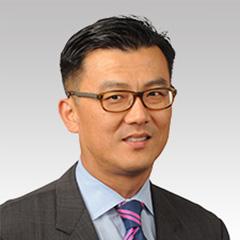Fordham Law Professor Thomas H. Lee, an expert on constitutional law, civil procedure, and litigation, was skeptical of the legal reasoning behind former President Donald Trump’s claim that he is immune from criminal prosecution.
Lee and other legal scholars were invited to unpack a number of looming constitutional challenges ahead of the 2024 presidential election at the Fordham Law Voting Rights and Democracy Forum’s inaugural symposium in early April. The panelists explored election security, speech, and related issues in the wake of the January 6 insurrection as well as Trump’s ongoing criminal trials and the unique legal questions they raise for U.S. democracy.
 “Trump makes the argument that he can only be prosecuted for a crime if he were actually impeached and convicted, but I think that’s not a persuasive reading of Article II, Section 4,” said Lee. Using legal reasoning and hypotheticals, he argued that former presidents should be immune with respect to allegedly official acts in exercising their constitutional powers, but there are circumstances under which presidential immunity may not, and should not, be granted. Where that line is, Lee said, was hard to nail down, but it seemed unlikely that the allegedly official acts Trump engaged in (assertions of irregularities in a presidential election in which he himself was the incumbent) were taken in the exercise of any powers the Constitution vests in the President.
“Trump makes the argument that he can only be prosecuted for a crime if he were actually impeached and convicted, but I think that’s not a persuasive reading of Article II, Section 4,” said Lee. Using legal reasoning and hypotheticals, he argued that former presidents should be immune with respect to allegedly official acts in exercising their constitutional powers, but there are circumstances under which presidential immunity may not, and should not, be granted. Where that line is, Lee said, was hard to nail down, but it seemed unlikely that the allegedly official acts Trump engaged in (assertions of irregularities in a presidential election in which he himself was the incumbent) were taken in the exercise of any powers the Constitution vests in the President.
As the only publication of its kind, according to Editor in Chief Sonia Montejano ’24, the Forum is an online student-edited publication featuring timely essays and articles about today’s legal issues impacting democratic institutions, civil rights and liberties, and electoral systems.
“The Forum’s mission is to provide a home at Fordham Law for discussions about the state of our democratic institutions and civil liberties,” said Montejano. “Given the unique legal questions this election is presenting, there was no question that our inaugural symposium would have to center on these issues. We’re really proud of the outcome and grateful to the stellar group of academics and practitioners for sharing their analysis.”
As the Supreme Court prepares to hear oral arguments on Trump’s immunity claims on April 25, Lee predicted that a decision will likely be handed down before the end of June.
Even so, the panelists agreed that a host of thorny legal questions will continue to dog this election cycle and may not be resolved until after Election Day, November 5.
“There was great turnout and engagement from the audience, and the panelists all did a superb job [at the event],” said Nora Donnelly ’24, managing editor of the Forum. “Our hope is that attendees left with an appreciation for how interesting this area of law is and a greater understanding of the issues at stake in this particular election.”



